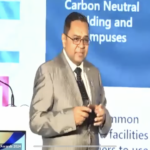Women-led Solutions Imperative For Combatting Climate Change – Experts

Experts advocate for women-led initiatives to tackle climate change and promote sustainability, emphasizing the need for inclusive policies and diverse leadership
At the World Sustainable Development Summit 2024, held to address pressing environmental challenges, a powerful theme emerged: the vital role of women in leading green development initiatives. Experts from various fields converged to discuss the need for women to not just be recipients but active drivers of change in sustainable development efforts.
Charlotte Morton, Chief Executive of the World Biogas Association, highlighted the glaring disparity in decision-making processes, particularly concerning issues like waste management and renewable energy. She emphasised that despite women bearing the brunt of climate change and waste management challenges, their perspectives are often sidelined. Morton pointed out the lack of diversity in leadership roles, with less than 14 per cent of women occupying senior management positions in renewable energy sectors.
Purvi Mehta, Senior Advisor at the Gates Foundation, shed light on the disproportionate impact of climate change on women, especially in the agricultural sector. With over 45 per cent of crop production and more than 70 per cent of livestock production managed by women in countries like India, their contributions are significant. However, women farmers face numerous challenges, including limited access to resources and lower market prices for their produce. Efforts to address these challenges require a deeper understanding of women’s roles in sustainable farming practices and increased support through initiatives like mentorship programs.
Dipankar Saharia, Senior Director at TERI, underscored the persistent gender disparities in various sectors, particularly in rural regions of India. He highlighted the resilience of women in the face of natural calamities like floods in the Northeast. Despite progress in recognising women’s contributions through initiatives like biogas programs and self-help groups, challenges such as lack of awareness and financial independence persist. Saharia emphasised the need for comprehensive policies that ensure equal access to resources and education, empowering women to drive sustainable development.
Shailly Kedia, Senior Fellow at TERI, echoed the importance of promoting women-led development initiatives. She emphasised the need for initiatives like gender budgeting to prioritise women’s development and ensure their active participation in decision-making processes. Kedia highlighted successful examples of women’s leadership, such as the “Lighting a Billion Lives” initiative, which demonstrated women’s effectiveness as change agents in addressing challenges like energy poverty. She stressed the importance of fostering diversity and inclusion at all levels of decision-making through mentoring programs and equitable policies.
The experts emphasised that empowering women to lead sustainable development efforts is not just a matter of equality but a strategic imperative for addressing pressing environmental challenges. By amplifying women’s voices, promoting gender diversity in leadership and providing support through initiatives and policies, India can pave the way for inclusive and sustainable development in the years to come.





































































































































































































































































































































































































































































































































































































































































































































































































































































































































































































































































































































































































